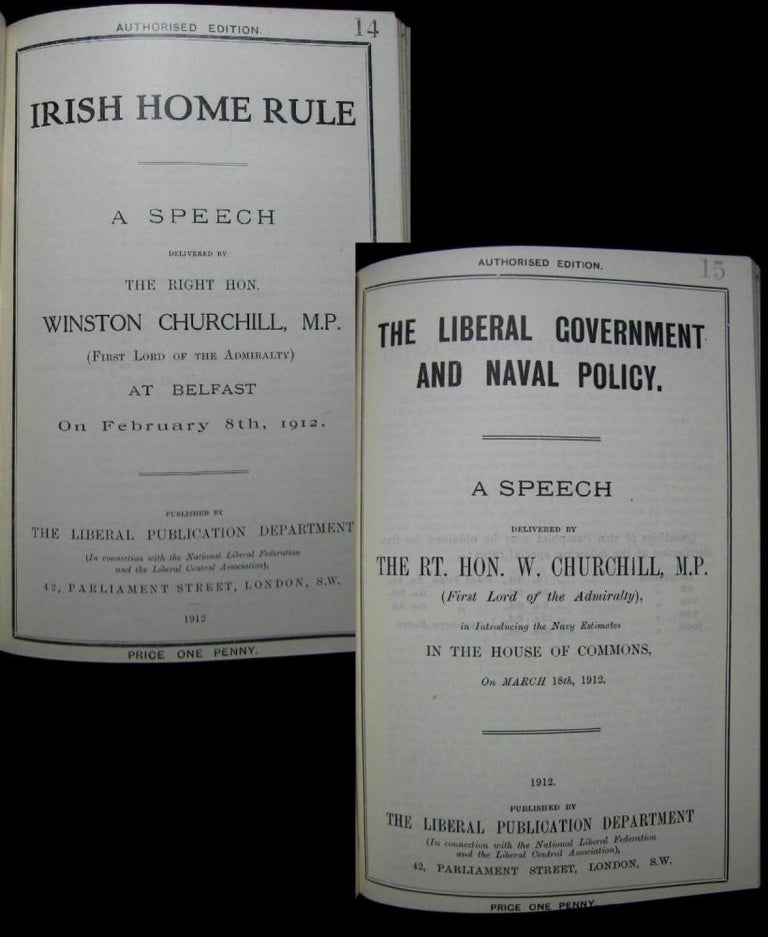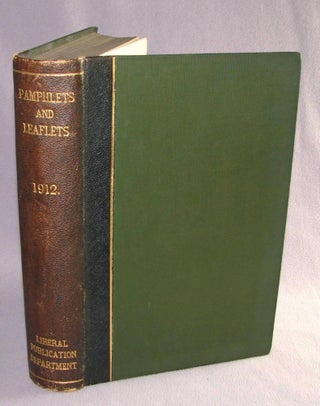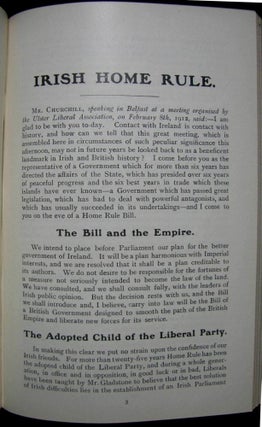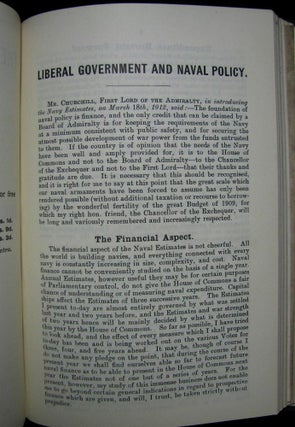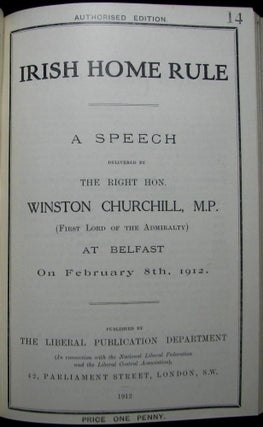Two speech pamphlets: Irish Home Rule delivered 8 February 1912 and The Liberal Government and Naval Policy delivered 18 March 1912
London: The Liberal Publication Department, 1912. First edition. Hardcover. Here are original, first printing pamphlet publications of two seminal Churchill speeches. The first is Churchill's controversial 8 February 1912 speech in Belfast supporting Irish Home Rule. The second is Churchill's 18 March 1912 speech in the House of Commons - his first time as First Lord of the Admiralty introducing the Navy budget and setting British strategy to counter Germany in a naval arms race. Both pamphlets feature Churchill's resolute and eloquent independence, showing the character that later carried him through political isolation in the 1930s into the hard-won triumphs of World War II.
Both pamphlets are in pristine condition, being bound in the volume "Pamphlets and Leaflets 1912" issued by the Liberal Publication Department in 1913. These bound compilations were issued annually - usually in utilitarian bindings with black morocco spines over ribbed green cloth boards.
This scarce 1912 volume bears two important, rare, and keenly sought original Churchill speech pamphlets. Irish Home Rule is a 16-page wire stitched pamphlet in paper covers, published by The Liberal Publication Department and printed by Page & Thomas, Ltd., Chesham. Churchill's family had supported unyielding British control over Ireland. His father, Lord Randolph Churchill, won political victories through his support of the Unionists in Ulster. Over time, Winston came to support Home Rule, spurred by the successful example of South Africa, where he had been so involved in his early career.
On 8 February 1912 Winston spoke in Belfast in favor of Home Rule - the same Belfast where his father, Lord Randolph, famously opposed Home Rule, declaring in 1886 "Ulster will fight and Ulster will be right." Winston's 1912 reply: "Why cannot this great settlement be made? We have made friends with our enemies; can we not make friends with our comrades too?" This was a major and controversial event, involving extraordinary precautions to protect Churchill's physical safety from hostile crowds. The Home Rule crisis of 1912-1914 was sidelined by the outbreak of World War I. Nonetheless, Churchill would ultimately introduce the Irish Free Sate Bill, which won passage in 1922.
The Liberal Government and Naval Policy is a 24-page wire-stitched pamphlet in paper covers published by The Liberal Publication Department and printed by the National Press Agency Ltd., London. In 1911, Churchill was offered the prize Cabinet position of First Lord of the Admiralty, which he held until 1915 when blame for the Gallipoli disaster forced his resignation.
In 1912, a global naval arms race was in full swing among the great powers. Until Germany began flexing naval muscle in 1911, Churchill was reluctant to squander public money and favored building fewer Dreadnought battleships than some of his Cabinet peers. But in February of 1912 Churchill called for formation of an additional Battle Squadron in Home waters and an increase in the number of ships, stating "there is no longer any financial saving to be looked for." His Naval budget and policy speech in the House of Commons 18 March 1912 laid out plans to address the German threat and ensure Dreadnought supremacy.
Churchill's speech was praised for candor and clarity. To his credit, Churchill sought to leverage peace from the position of increased strength; in the months following his speech, Churchill pressed - unsuccessfully - to reduce Anglo-German tension and temporarily halt naval construction.
Both of these rare speech pamphlets encapsulate pivotal evolutions in Churchill's personal and political character. The speech pamphlets are perfectly preserved within the binding. The binding itself is in near-fine condition. The pebble grain leather spine shows very light sunning, but retains bright gilt, shows only minor wear at the spine ends, and remains supple with no cracks. The ribbed green cloth boards are bright and clean.
Reference: Cohen A35.1 & A37, Woods A20(a) & A21. Item #000961
Price: $1,000.00

